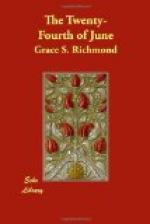Ruth shook her head in dumb wonder that any one could be so impervious to the charms of the young man who so appealed to her youthful imagination. Three hours afterward, when she turned in her chair, in the Stuart Henderson ballroom, at the summons of a low voice in her ear, to find Richard Kendrick in the row behind her, she wondered afresh what there could possibly be about him to rouse her sister’s antagonism. His face was such an interesting one, his eyes so clear and their glance so straightforward, his fresh colour so pleasant to note, his whole personality so attractive, Ruth could only answer him in the happiest way at her command with a subdued but eager: “Oh, I’m so glad you came!”
“That’s due to Mrs. Cartwright’s wonderful kindness. She’s the mother of Petruchio, you know,” explained Richard, with a smiling glance at the gorgeously gowned woman beside him, who leaned forward also to say to Ruth:
“What is one to do with a sweetly apologetic young cousin who begs to be allowed to come, at the last moment, to view his cousin in doublet and hose? But I really didn’t venture to tell Olivia. She would have fled from the stage if she had guessed that cousin Richard, whom she greatly admires, was to be here. I can only hope she will not hear of it till the play is over.”
“If his being here is going to make Petruchio tremble more, and Katherine act naughtier, I shall feel dreadfully guilty,” thought Ruth. But somehow when the curtain went up she could not help being glad that he was there, behind her.
Roberta had said much, in hours of relaxation after long and tense rehearsals, of the difficulty of making schoolgirls forget themselves in any part. It had been difficult, indeed, to train her pupils to speak and act with naturalness in roles so foreign to their experience. But she had been much more successful than she had dared to believe, and her own enthusiasm, her tireless drilling, above all her inspiring example as she spoke her girls’ lines for them and demonstrated to them each telling detail of stage business, had done the work with astonishing effect. The hardest task of all had been to find and develop a satisfactory delineator of the difficult part of the Tamer of the Shrew, but Roberta had persevered, even taking a journey of some hours with Olivia Cartwright to have her see and study one of the greatest of Petruchios at two successive performances. She had succeeded in stimulating Olivia to a real determination to be worthy of her teacher’s expressed belief in her, even to the mastering of her girlish tendency to let her voice revert to a high-keyed feminine quality just when it needed to be deepest and most stern.
The audience, as the play began, was in the customary benevolent mood of audiences beholding amateur productions, ready to see good if possible, anxious to show favour to all the young actors and to praise without discrimination, aware of the proximity of proud fathers and mothers. But this audience soon found itself genuinely interested and amused, and with the first advent of the enchanting Shrew herself became absorbed in her personality and her fortunes quite as it might have been in those of any talented actress of reputation.




